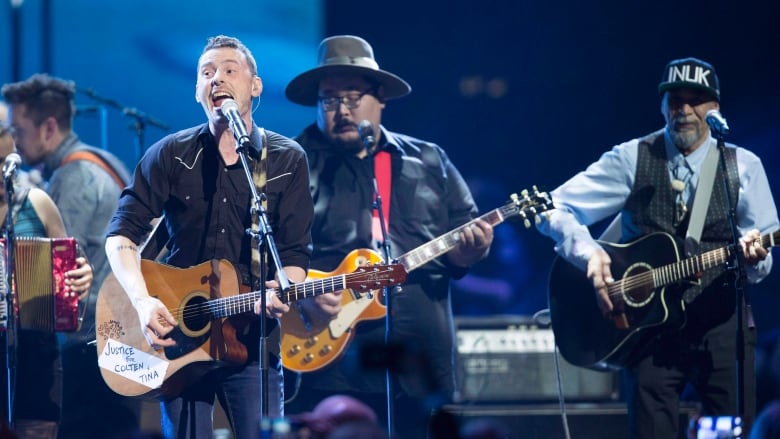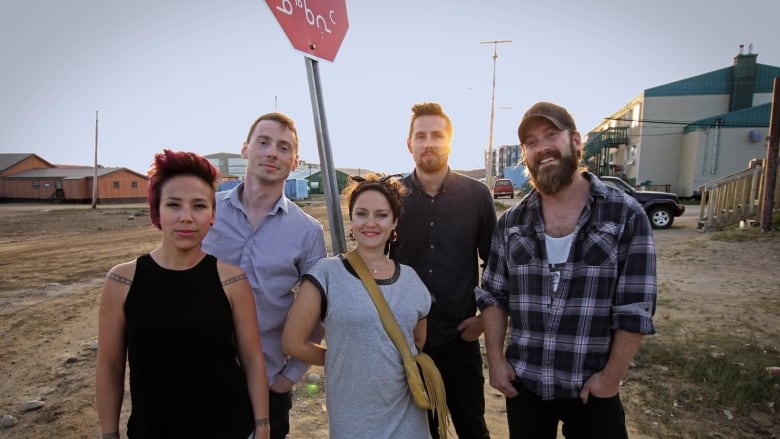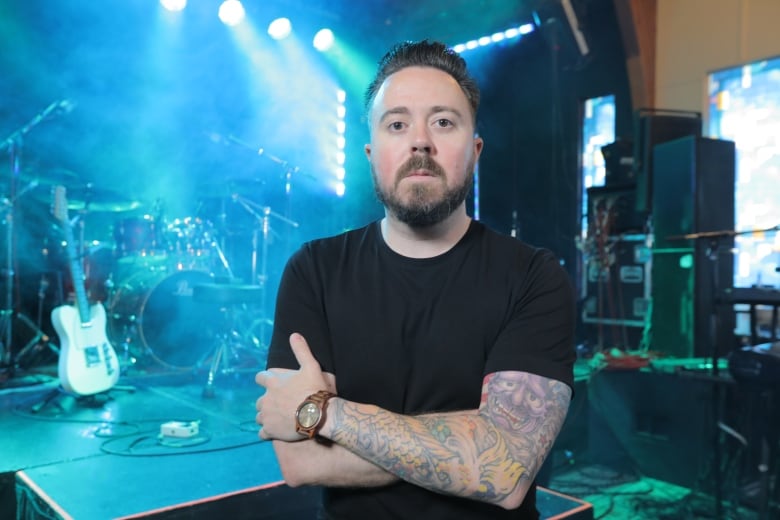A problem of popularity: How Canada’s northern musicians are hurt by lack of access

Andrew Morrison of The Jerry Cans is setting up to play what would be — for most bands with their popularity — a standard-sized gig at Toronto’s Horseshoe Tavern. Instead, the concert has become something much bigger: a showcase of northern Canadian musicians that he and his bandmates hope makes the money they spent on the trip worthwhile by maximizing the participating bands’ exposure.
It took more than $10,000 to get the five-piece band from Iqaluit (Nunavut), where they’re based, to Toronto — and that’s only counting the plane tickets. It’s a significant amount of money for the band, which performs largely in the Inuktitut language.
“Touring is super-challenging,” Morrison said a few hours before the group’s show, part of the Curator Series during Toronto’s North by Northeast (NXNE) music and arts festival.
“Even for this show, we’re paying for it,” he said, since they’ve already used up all the grant money they’re eligible for and have received.
Northern Canadian musicians are ballooning in popularity, thanks in large part to streaming, which has given these artists the ability to reach audiences as never before. But it’s also forcing them to rely more heavily on live shows and touring to generate an income. In the past, they would have benefited from album sales.
Artists from Canada’s remote communities face a particularly difficult, expensive and emotionally draining reality of struggling to simply get to the same venues that musicians from the South can easily access, said Morrison and Jerry Cans bandmate Nancy Mike.

“[Flying] from Iqaluit to Ottawa is, like, $2,200 return for one person,” said Mike.
And because they took every opportunity to play as many dates as possible while touring in the south, “we’d be exhausted by the end of it,” she said.
Northern spotlight
In the past 10 years, northern and Indigenous music has been winning over bigger and bigger audiences, and some artists have leveraged that into international recognition, said Morrison and Mike.

Renowned Nunavut throat singer Tanya Tagaq, a Juno Award- and Polaris Music Prize-winner, was recently profiled on 60 Minutes, while Northern Quebec singer Elisapie Isaac (who performs as Elisapie) was featured on NPR’s All Things Considered in March.
Josh Qaumariaq, a Nunavut “Arctic soul” singer and one of The Jerry Cans’ featured NXNE guests, was recently signed by Toronto entertainment agent Julien Paquin and is headed to Nashville’s Americanafest in September.
Meanwhile, The Guardian sent reporters to Iqaluit to cover the “booming” Inuit music scene and Nunavut Music Week — an event founded by members of The Jerry Cans in 2017. The writers interviewed local artists like electro-pop singer Riit and Juno-winner Aasiva.

“Iqaluit has always had lots of talented people; it’s just now, and in more recent times, it’s been building outside of Iqaluit, outside the territory and even outside Canada,” said Morrison.
“People are finally sort of paying attention to what I think are already amazing things that have been happening there for many, many years.”
Mike, the sole Inuk member of The Jerry Cans, believes the fascination is largely fuelled by an interest in Indigenous artists.
“Indigenous people now are proud to present what their talents are to the world, and feeling a little bit more comfortable” doing so, she said.

Though some critics argue there still aren’t enough Indigenous musicians on services like Spotify, the music industry’s switch to a streaming model has undeniably had a profound effect. According to the International Federation of the Phonographic Industry, streaming now constitutes nearly half of all revenue in the global recorded-music market.
“Music has never been so global as it is right now,” said Liam Killeen, an artist manager at Coalition Music who also teaches a talent management course at Ryerson University in Toronto.
In this environment, Killeen said, artists from Nunavut, the Northwest Territories and Yukon can just as easily be discovered as those who are closer to musical hotspots and urban centres.
But unlike when artists could rely on album sales for revenue, they must now rely on streaming, which earns them much less, forcing them to focus on alternative sources of income. This can put a disproportionate strain on northern acts.
“If we look at touring [for a young artist from the North] — which is so, so vital nowadays … to building a real fan base — the biggest issue you’re going to find is logistics,” Killeen said from Coalition Music’s Toronto-area headquarters.
In the red ‘before your first show’
The inaccessibility of some northern communities can push the price of goods above five times the national average, because flights from Nunavut and Canada’s other territories are uniquely expensive. Couple that with the already high expense of music production, and you start to understand why artists from the North are at a significant disadvantage.

To travel to southern cities such as Edmonton, Calgary, Vancouver or Toronto, artists will already have spent several thousand dollars before they’ve even touched down, Killeen said.
“It’s a little bit daunting to see how in the red you are before you’ve played your first show.”
As a result, northern artists will often try to maximize their trips by staying for long periods and playing more venues. Renting a vehicle and trailer, including insurance, adds to the bill.

It’s true that musicians from all over Canada string together shows for months-long tours, but it doesn’t compare, Killeen said.
For instance, southern Ontario bands are “spoiled” because they can play “50 shows between Windsor and Montreal” while spending most of their time at home, “not in a hotel, not taking those expenses,” he said.
Funding ‘not proportional’
There is help available. All Canadian musicians can apply for provincial and federal funding, such as from Canada Council for the Arts, as well as compete for grants from the Foundation Assisting Canadian Talent on Recordings (FACTOR), a private-public arts funding agency. Musicians from remote communities are eligible to apply for additional funds, up to $1,000 per band member, depending on which province or territory the musician is from.
In 2017-18, for example, The Jerry Cans received nearly $70,000 from the government of Nunavut, which also sponsors Nunavut Music Week.
But even that amount doesn’t go far enough, Killeen said: Hotels, transportation and gas for multiple tours a year can leave a band $30,000 in the red.
In addition, it costs money to fly south to record with the experienced producers and technicians that southern bands have much easier access to, Morrison said.
While it’s important to acknowledge the financial support of groups like FACTOR and the Canada Council, “it’s still very little,” he said. “It’s not proportional compensation for what needs to happen up North.”
The temptation to move south
Singer Qaumariaq, who performs as Josh Q and lives in Iqaluit, is also grateful for grants he’s received from groups like the Canada Council, but said it’s still not enough. He constantly weighs whether shows south of Nunavut are even worth performing.
Even though he’s at the beginning of his career, when an opportunity to play across Canada is especially valuable, he turns down gigs he would love to accept. At times, instead of travelling and performing with his full band, The Trade-Offs, he hires local studio musicians to help offset costs.

“Each time we get offers and the places cannot offer [to pay for] travel … we are like, ‘Is it worth it?’ Because it’s so expensive,” he said.
The temptation to leave his home and move south is always there, Qaumariaq added, because it would be easier and cheaper.
Other artists have taken a similar path. Tagaq, one of northern Canada’s most successful artists, spends much of the year in Toronto, returning to her hometown of Cambridge Bay, Nunavut, in the summer.
But for The Jerry Cans, moving south isn’t an option.
“Not a chance,” said Morrison.
Moving south to advance her musical career is impossible, Mike said, because her creativity is tied to her home — the source of her inspiration. It’s what makes the situation so difficult: She makes the music she does because of where she’s from, but feels the resources to succeed aren’t there. In addition, the struggle of staying on the road for months at a time puts a strain on her mental health and forces her to spend time away from her three children.
“When I go outside [in Toronto], I see cement,” said Mike.
“When I get home, step on my home grounds, that’s when I feel all colours come out, like I can be me again.”
Related stories from around the North:
Canada: Canada mourns death of legendary Inuk singer Charlie Panigoniak, CBC News
Finland: Finland hosts first Nordic visual song contest, Yle News
Norway: Norway sends song with Sami joik to Eurovision Song Contest, The Independent Barents Observer
United States: Indian Agent, the Alaska band reclaiming Indigenous voices, Alaska Dispatch News




Your music comes to me a perfect masterpiece. I often listen to them on my mobile device at night. Especially my phone has ringtones for songs. Thank you
They are true artists, and their work deserves respect and public exposure. They need a communicator to bring their music to the public.
Increase communication and marketing measures. If they really have talent, they will be accepted by the public.
Nowadays there are a lot of online media to help them promote their brands.
C’est vraiment merveilleux
Thanks for the article shared from you, it’s very nice and wonderful.
I think there is more attention to musicians in Canada, they are all passionate about the arts, dedicating their brains and talents to the arts, but no one wants an artist Nobody knows and struggles with the rest of his life after devoting all his talents that no one knows
It’s sad that I don’t think singers have such suffering. They deserve to be known, their songs need to be known by them more than that is my wish.
very good
Your article is very informative and helpful
The group that I follow and love , it’s great to hear and see them perform
Thanks for sharing this interesting information